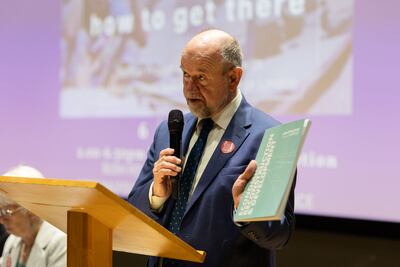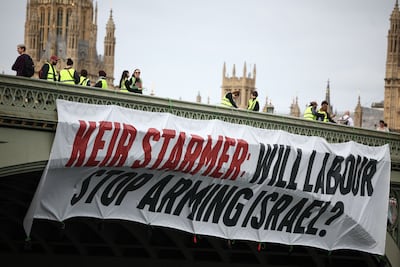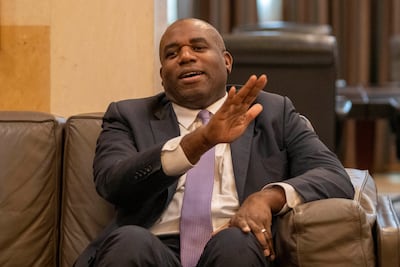Live updates: Follow the latest news on the UK general election
Former British diplomats who served in the Middle East have called on the UK's prospective government to recognise a Palestinian state and ensure that commitment to international law is upheld “without fear or favour”.
The general election on July 4 could see the Labour Party come to power for the first time in more than 14 years, and the party's leadership has been forging its policy on the Israel-Palestine conflict.
Labour Party leader Keir Starmer has said he would recognise a Palestinian state “as part of a peace process”, which will be included in the party’s manifesto next week. It would also commit to ensuring such a move is not vetoed by a neighbouring country.
During a visit in London on Friday, Mr Starmer said: “That needs to be part of the process, it’s very important we have a viable Palestinian state alongside a safe and secure Israel.”
He added: “It is an inalienable right of the Palestinians, it’s not in the gift of Israel, so it has to be part of the peace process.”
Asked whether this will be in the party's manifesto, he said: “It will be.”
Palestine in Labour manifesto
Last month, Mr Starmer, who is in pole position to become the next prime minister, said that he wanted to recognise a Palestinian state if he won power, but that this would need to come at the right time.
This followed strong opposition to Mr Starmer's initial support for Israel's war, in which he said the country had the right to withhold water and power from Gaza, and the party's refusal to call for an arms embargo.
Labour faced setbacks in recent local elections in some previously safe areas, particularly those with large Muslim populations, where candidates may have suffered as a result of Sir Keir’s stance on the Gaza war.
Accusations of a “purge” of Labour's left-wing candidates have also given momentum to the growing movement of independents who are challenging the party over Gaza.
Recognition without peace
The next government would need to recognise the State of Palestine regardless of whether a peace process was in place, said Sir Vincent Fean, former consul general to Jerusalem and trustee of the Balfour Project, a British charity focused on the UK's role in the Palestinian issue.
“We need to move on from the idea of linking it to bilateral negotiations, because under [Israeli Prime Minister Benjamin] Netanyahu, they are not forthcoming,” he told The National.

The recognition could be part of a UN Security Council Resolution drafted by the UK which would bypass Israel, or be done in co-operation with western partners. “If you have to link it to anything, link it to partners like Australia, France – going together if need be but not essential – because it would increase the impact,” he said.
He also recommended a ban on trade with settlements and a commitment to upholding international law. The Balfour Project takes its name from the 1917 letter by Lord Balfour, the foreign secretary who declared the UK would support a Jewish homeland in Palestine.
Withdraw from Gaza
An action plan for the UK to ensure the establishment of a Palestinian state has been drawn up by the Balfour Project. It recommends that the UK insists on a complete Israeli withdrawal from Gaza, and supports the foundation of a Palestinian interim government that unites all the territories.
In the long term, the UK should also support Palestinian civil society and political groups in the run-up to elections, ensuring they build a “broad coalition” which also recognises Israel along pre-1967 borders. The UK should also be part of an international coalition that guarantees the security of both Israel and Palestine during a transitional phase.

A prospective government should make a “serious effort” to build an international coalition that would work towards a peace process, said Richard Makepeace, a diplomat of 35 years and former consul general in Jerusalem, who was not involved in the drafting of the action plan.
“[It] would drive forward pressure for the only possible solution, which is one that meets both Palestinian and Israeli objectives, and allows both peoples to live in peace,” he told The National.
The coalition would also involve regional Arab states, who he said were “more engaged” now than in earlier processes. “I think it's really a time for trying to make sure that there is the biggest possible consensus that really this cannot be allowed to happen again,” Mr Makepeace said.

A new UK government would do well to grasp the importance of the Palestinian issue among the public. “Both the Labour Party and the Conservative Party have failed to show the concern which the public expect about what's going on in Gaza,” he said.
An unresolved Palestinian issue was more than just a historical problem for the UK, he added. The current conflict had shown impacts on regional stability with the risk of a wider war.
Litmus test
The war had also become a “litmus test” for millions of people around the world, putting the West’s “credibility and influence” at stake. “It must be obvious to American leaders and European leaders that when we went to seek the support of the world over Ukraine, we got a very doubtful response,” Mr Makepeace said.
“Part of that is because of our attitude towards Palestine and a feeling that the rules-based order only seems to protect those who matter to you [America and Europe],” he said.
Regional contacts
Shadow foreign secretary David Lammy has been shaping Labour’s response to the war in Gaza through continued trips across the Middle East, and stepping up his criticism of Israel’s conduct.
“I welcome the fact that he's been reaching out into other European countries, but also to the US, and I understand the constraints that will be on him, particularly if Trump is elected as president,” said Phyllis Starkey, a former Labour MP and vice chair of the Balfour Project’s board of trustees.
But more could be done by Labour to highlight Britain’s interests in the Palestinian issue. “We have a historic debt to Palestine through the Balfour Declaration,” she said.
Support for ICC
Mr Lammy has supported the International Criminal Court seeking warrants for Mr Netanyahu and Israeli Defence Minister Yoav Gallant – in direct opposition to the government's stance.
Ms Starkey was “reassured” by Mr Lammy's commitment to respecting the decisions of the ICC and the International Court of Justice. “Not only because it is the right thing to do. It is in the interest of the British people to make sure that the rule of law is maintained, without fear or favour, because it protects us as well,” she said.
Christopher Segar, a former diplomat of over 30 years with postings mainly in the Arab world, urged a prospective Labour government to consult experts who are “outside of government and outside the Labour Party” to get a broad range of perspectives.
“London has a huge resource at Chatham House, at LSE, at SOAS, of people who have devoted their lives to the Middle East, the Arab world and North Africa, and that is a great resource,” he told The National. “People overlook how useful that can be.”

Western and Arab relations had changed with other issues, such as security threats from Iran and the energy transition, coming to the fore over the Palestinian issue.
“In the past, we were worried that the Arab states were so passionate about Palestine that we had to take that into account in our dealings with them. This is one of the things that underlay the euro, our dialogue and all that in the 1970s and 1980s,” he said.
In light of this, the UK could work with European states on the formation of a “European position” which would make the Palestinian issue “a matter of international principle”.
“After Brexit, we don't formally have European partners. But there's no harm in trying to align our position on the Middle East along with the European Union and make a bloc advocating a particular set of recommendations,” Mr Segar said.



























































































